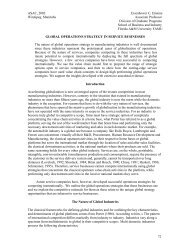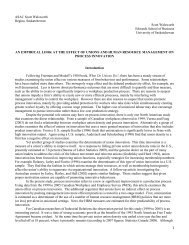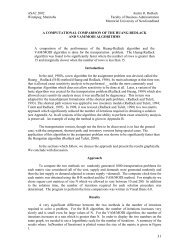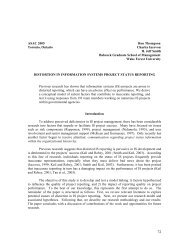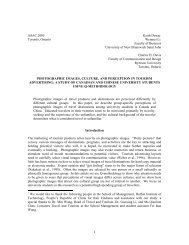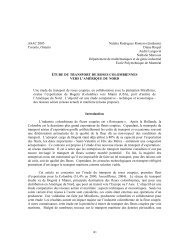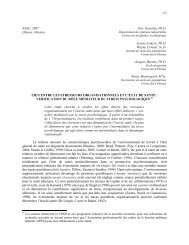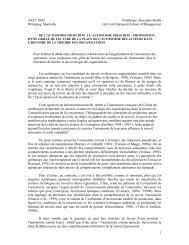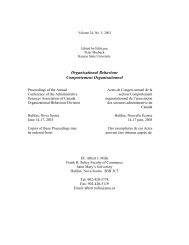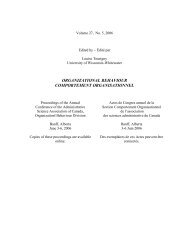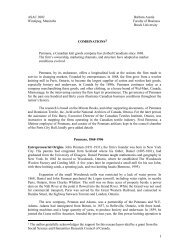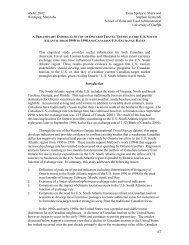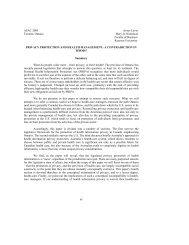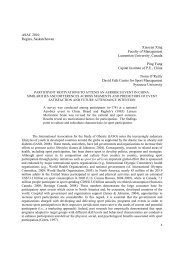ASAC-IFSAM 2000 Conference
ASAC-IFSAM 2000 Conference
ASAC-IFSAM 2000 Conference
Create successful ePaper yourself
Turn your PDF publications into a flip-book with our unique Google optimized e-Paper software.
such developments in their respective organizations. As a result each organization was grapplingwith a number of change initiatives.The various changes the two organizations strove to introduce included an emphasis onteam-work, quality, and diversity. All three concepts required a shift for the companies to adifferent style of operating. Each of the change initiatives questioned and challenged existingorganizational values, norms, beliefs, behaviours, reward systems and the general modus operandiof the each company. In addition to changed actions and behaviours, different constructions ofmeaning and sensemaking (Weick, 1995) were required by organizational members for them to beable to respond to the changes. We were interested in conflicting and converging views of thechanges, the overt and covert resistance to change and the perceived success of the outcomes byorganizational members. The two case study organizations and the particular change initiatives eachwas hoping to implement will now be briefly explored.TechnicaTechnica is an internationally recognised company that develops and manufacturesadvanced technology. It is a company in which the sales people are well rewarded compared to thetechnical people even though it is the latter group who actually provide the ongoing support andservice that generates a large amount of revenue. During the course of the field study, Technicaattempted to implement a number of wide-ranging change initiatives. The U.S. Head Office ofTechnica developed a set of five values known as “Our Common Bond.” All Technica staff worldwidewere expected to embrace the five values associated with this common bond as the guidingprinciples for working at Technica and interacting with staff and customers. The values were:Respect for individuals; Dedication to helping customers; Highest standards of integrity;Innovation; and Teamwork.Valuing Diversity. The first value, Respect for the Individual, was Technica’s way oftrying to manage and value diversity. Diversity issues are particularly relevant in organizations oftoday. New Zealand, like other Western countries, is becoming an increasingly multicultural societyand workforce (e.g. Humphries & Grice, 1995; Pringle & Scowcroft, 1996).The value Respect for the Individual was Technica’s strategy for addressing diversity issues in theworkplace. The corresponding description for this value was:We treat each other with respect and dignity, valuing individual and culturaldifferences. We communicate frequently and with candor, listening to each otherregardless of level or position.It is interesting to note that while many Technica members stated that Our Common Bond valueswere positive in general and that respecting individuals was important, many participants felt thatthe value had little impact on the actual behaviour of Technica members, especially those in seniorpositions. In fact, Technica staff suggested that the values gave those in management an additionaltool from which to control and sanction the behaviour of staff (Casey, 1995). Indeed, despite thefocus on respecting differences, the values actually provided a mechanism for managers toencourage assimilation.“The Common Bond has had no impact and so therefore the training was a waste ofvaluable time. It was a reaction to a couple of harassment problems in the US andthe “feel good” approach to business at Head Office [USA]. But people here in theNew Zealand office, especially in management positions, make ad hocinterpretations of the values and use it to justify their own cause or excuse poorbehaviour.”<strong>ASAC</strong>-<strong>IFSAM</strong> <strong>2000</strong> Proceedings 4



